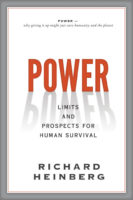 This is an abridged excerpt from Power: Limits and Prospects for Human Survival (2021) by Richard Heinberg; posted with permission from New Society Publishers.
This is an abridged excerpt from Power: Limits and Prospects for Human Survival (2021) by Richard Heinberg; posted with permission from New Society Publishers.
There’s a paradox hidden in the project of global human self-restraint. …[G]lobal cooperation is needed to address global problems. Yet, as we restrain certain of our powers, societies will need to become more localized (i.e., deglobalized), and may do so by default even if that is not the intention.
Globalization and urbanization are trends with a shelf life. Both depend on high rates of energy usage—especially for transportation, communication, and data processing. Current petroleum-based transport fuels are depleting and polluting. The project of substituting electric transport for liquid-fueled transport has begun, but is going much too slowly to avert crisis, and will be limited in scope by energy transition trade-offs and barriers already discussed. As a result, we probably face a future of less and more costly transportation. That means less global trade. It also translates to a less mechanized, more labor-intensive, and more localized food system, which entails more people growing food in the countryside and fewer living in cities.
A more locally-organized and more rural society may serve its members’ psychological health better than one that is globalized and highly urbanized: we evolved living in small groups and function best in contexts where we know one another face-to-face. And living in more direct contact with nature encourages us to maintain a healthy relationship with it. Crucially: when political and social entities grow in size, social power increases, leading to the possibility of inequality in power and the abuse of power on a larger scale. One way to keep power abuses and inequalities manageable is to keep the scale of social organization small.
…Ecologists have been telling us that “small is beautiful” since the 1960s, but trends have gone in just the opposite direction, resulting in the flourishing of the Superorganism. Nobody designed this vast, intricate web of global interconnectedness, and no one can control it. It is an emergent phenomenon—something that could not have been predicted on the basis of a thorough knowledge of its constituent parts. We may be able partially to control various subsystems of the Superorganism, but the entity itself has its own inherent priorities and imperatives. It favors anything that leads to its growth; it discourages anything that impedes expansion.
For example, millions of individuals, as well as thousands of nonprofit environmental organizations and even many for-profit corporations, are deeply concerned about climate change. Yet, as we have seen, humanity as a whole is still increasing its greenhouse gas emissions, cutting forests, and doing all the other things that undermine climate stability. Why are sustainability efforts failing? It’s easy enough to blame greedy oil executives, but doing so merely shifts attention away from our own collective insistence on maintaining overall economic growth. This growth imperative—which at its core is a drive toward power and capital accumulation—washes up and down, left and right throughout the institutions (political parties, governments, and businesses) and levels of organization within society. Even if, individually, we can see that human society is exceeding natural limits, we collectively elect leaders who promise more resource extraction, manufacturing, and trade. The Superorganism has its way.
In a sense, the Superorganism is just a large-scale expression of certain innate human traits. But it is also something genuinely new. It is all of humanity acting together, largely unwittingly, to form the most powerful living entity in Earth history. While humans have been cooperating in groups for a very long time, the global Superorganism is only decades old.
Reversing the trends leading toward global crisis and collapse might seem to require the breakup or disempowerment of the Superorganism. Yet, since we need global communication and cooperation to address global problems, it might be preferable for the Superorganism to survive and mature—to become aware of itself and of natural limits. Humanity became ultrasocial through its development of language, cooperation, technology, and hypersociality. Our survival may depend not on repudiating these, but on developing them to a higher level.
The Superorganism is still an infant, and it has not had much opportunity to test its limits. Individual humans can recognize limits and learn how to live within them by trial and error. Even groups of humans are capable of understanding when their collective behavior threatens long-term sustainability. Unfortunately, the global Superorganism currently has the intelligence of an amoeba. It adheres strictly to the maximum power principle, so it knows only how to grow and amass ever more power. This puts it entirely at odds with an environment characterized by natural limits and hidden feedbacks.
A mature global Superorganism governed by the optimum power principle [discussed in Chapter 6] is for now a purely theoretical entity. Perhaps it could emerge through a bottom-up process of building trust and understanding, and through the crafting of cooperative institutions and formal agreements for human self-limitation at ever-higher governmental levels (local, regional, national, and global). …We can only speculate whether, under conditions of declining global trade, worldwide communications could be maintained in such a way as to facilitate the expansion of such efforts so as to promote not just the survival, but the moral flourishing (in terms of declining violence and inequality) of our human hive.
If we can’t do those things, then the Superorganism may be short-lived. That doesn’t necessarily mean that humanity will go extinct, simply that the global economy and global communications as we know them will cease to function. And we will have to address global ecological problems without the benefit of international coordination, through bottom-up efforts in many places simultaneously. Such efforts are already sprouting up in towns and villages around the world, but they tend to get much less attention than international climate treaties, largely because climate change is a global problem presumably requiring global solutions.
Frankly, when looking at the factors arrayed before us, it appears to me that the gradual or piecemeal breakdown of global integration is highly likely. This isn’t a conclusion I particularly welcome, as it contradicts some values I have long held. We may be facing a less cosmopolitan, more tribal future, like it or not.
This is an abridged excerpt from Power: Limits and Prospects for Human Survival (2021) by Richard Heinberg; posted with permission from New Society Publishers.
Photo by Jacob Stone on Unsplash






